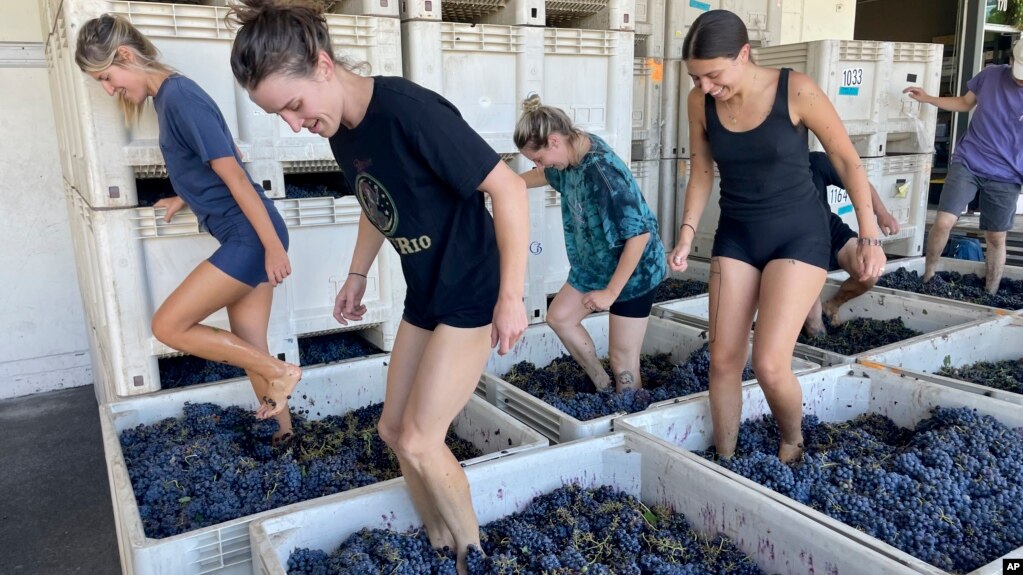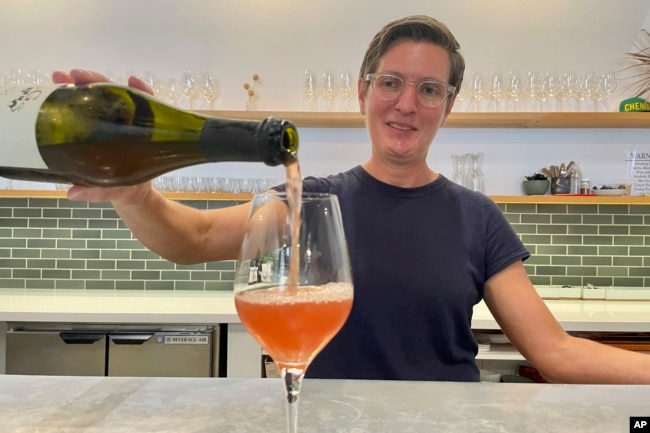Old Ways of Making Wine Gain New Fans

Wine made by ancient methods is gaining new fans.
Wine is an alcoholic drink made from fruit like grapes.
Natural wine uses methods that reduce processing and harmful effects on the Earth. Research company IWSR Drinks Market Analysis found that people in the U.S. are seeking natural wine in increasing numbers. At the same time, the number of wine buyers has been dropping since 2015.
Natural and other Earth-friendly wines made up less than one percent of sales in 2021. But demand for those wines was rising faster than other kinds on the whole, reported Drizly, an online site for ordering and shipping wine and other alcohol.
Most natural wines are made with organic grapes collected by hand. Organic growers do not use poisonous chemicals to stop or control insects or unwanted plant growth.
To make wine, the grapes need to be crushed. Some wine producers crush grapes by foot like people of ancient times. Afterwards, the crushed grapes ferment naturally. Manufacturers do not add water, yeast or other substances.
There are exceptions. Some natural winemakers add sulfites, a chemical produced naturally in grapes. Extra sulfites can help preserve, or keep, the wine. And some winemakers clear the final liquid of any small pieces that could make it look cloudy.
The result is wines that are earthy and less predictable than many of the wines created by bigger producers.

Erin Coburn, owner of the minimo wine shop in Oakland, Calif., pours a natural wine at her tasting bar on Sept. 7, 2023. (AP Photo/Haven Daley)
“The first time you taste it, you can tell it’s alive,” said John Keller. He is the owner and winemaker at Neu Cellars in Northern Michigan.
But selling natural wine processes can be difficult. Natural wine has no set definition in the U.S. It is not easy to find, since most natural wines do not identify as such on their labels.
“Natural just sounds good, but conventional wine is pretty natural too,” said Anita Oberholster. She is a professor in the Department of Viticulture and Enology at the University of California, Davis. “If the idea of natural wine is going to grow, we should do research on it and define it.”
Keller of Neu Cellars has a degree in biochemistry. He started out working for a big winemaker in California. But he left because he was not happy about all the chemical mixes it used. These include gelatin, oak dust, and eggs.
However, some say the line between natural and conventional wines is very narrow.
Many products added to wine, like yeast, are natural products, Oberholster said. And many conventional wines are made without adding anything.
Some in the industry would like to establish rules for producing natural wine. France’s wine industry took such action in 2020, enacting requirements that winemakers must meet to identify their wines as natural.
Some manufacturers argue that rules can make wine making more costly. Keller uses organic grapes but he says he cannot support the cost of repeated inspections for approval as an organic wine.
Anthony Zhang is the co-founder and CEO of Vinovest, a wine investment company. He sees another problem.
Vinovest says some wine companies are profiting from the lack of rules. They use labeling content like imagery that suggests their wine making is natural when they are not, he argues.
That can mislead buyers who often will pay higher prices for wines made by smaller producers that use natural methods.
However, buyers may have more information on wine bottles soon. Starting in December, wines sold in the European Union will have to identify on their labeling all the substances each product contains.
Oberholster expects the U.S. to pass similar measures as well in the next few years.
Words in This Story
ferment – v. to go through a chemical change that results in the production of alcohol
conventional – adj. common and ordinary
label – adj. a piece of paper or cloth that is attached to something to identify or describe that thing
https://learningenglish.voanews.com/a/old-ways-of-making-wine-gain-new-fans/7315061.html